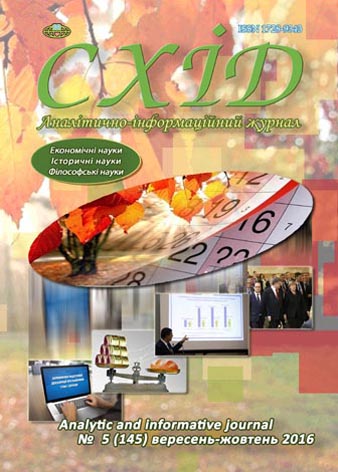The primary concepts of soviet urbanization or protos preudos social town
DOI:
https://doi.org/10.21847/1728-9343.2016.5(145).83850Keywords:
nomos, fuses, Soviet urbanization, revolution, total mobilization, the Soviet solidarity, wrong experienceAbstract
The article reconstructs the false foundations of Soviet designs imaginable urbanization detects starting social places concepts of "classical" days of building socialism. Projected into the future the idea of permanent revolution, the destruction of "bourgeois barbarism" and desire the establishment of legal order Bolsheviks led the workers to the approval of a new type of state and the formation of a new anthropological type of person. This type - "eternal revolutionary", "architect of the new world" had to live with a single purpose - to extend the principles of proletarian justice to the axis of the world.
The epicenter of the factory or the formation of the new man was an industrial city - industrial zone heroically-miltarism work. The main method of the formation of cities and the new man was a total mobilization, the image of the antagonistic enemy of mythic-Titanic goal, collectively practice of collective responsibility, temporal-topeni the control of the state-party bodies the army-camp architecture, etc. The Communists sought to build the city for centuries, people, nomos chose to build incubators "eternal revolutionaries", the barracks of the unknown soldier or barracks devotees of "Stakhanovite". In the draft party not only needs to become an industrial base for future victories over bourgeois barbarism, but also a gathering place loyal fighters for a revolutionary breakthrough - the construction of communism all over the world.
Social city - misguided or sinister space, which is not provided for the life of a healthy society. It is the fruit of pure nomos, state coercion, that denied cultural and national experiences, socio-economic patterns, cravings human being the ruins of the Communist concepts of permanent revolution and militarism of labor.
The experience of the Communist daydreaming inspires the statement that as an axiom of the relationship of nomos and fuses in urban (social) space is the right man for happiness. A key measure of their dialectical interaction is the reliance on the security and preservation of the integrity of human nature, national heritage, the experience of past generations.Downloads
References
Bauman, Zygmunt (2008), Globalization. The consequences for the individual and society [transl.], Publishing house «Kyiv-Mohyla Academy», Kyiv, 109 p. (ukr).
Nettle, D. (2015), Tyneside Neighbourhoods: Deprivation, Social Life and Social Behaviour in One British City, Open Book Publishers, Cambridge, UK. doi: 10.11647/OBP.0084
Lewandowski, J. D. and Streich, G. W. (2012), Urban Social Capital. Civil Society and City Life, available at: http://www.tandfebooks.com/isbn/9781315548708. doi: 10.4324/9781315548708
Shibu, R. (2010), Designing a Liveable CompactCity: Physical Forms of City and Social Life in Urban Neighbourhoods, Built Environment, Vol. 36, Number 1, 30 March, pp. 63-80. doi: 10.2148/benv.36.1.63
Junger, Ernst (2002), Worker. Domination and Gestalt; Total mobilization; About Pain. [translated], “Nauka Publishing”, St. Petersburg, 539 p. (rus).
Arendt, Hanna (2011), On Revolution [translated], «Europe Publishing», Moscow, 464 p. (rus).
Koselleck, Rayngart (2005), Рassed the Future. About semantics іstorichnogo hour. [translated], Dukh i Litera, Kyiv, 380 p. (ukr).
Pasko, I.(2013), Esey about tram, in: Istoriya. Natsіya. Osobystіst. Vybrane: іstorіosofskі etiudy ta manuskrypty, «East Publishing House», Donetsk, 378-396 (ukr).
Engels, Fr. (1961), The Housing Question, in: Marx, Karl & Engels, Friedrich. Collected Works, State Publishing House of Political Literature, Moscow, Vol. 18, pp. 203-284 (rus).
Kozlowski, Peter (2002), The myth of modernity: Poetic Philosophy of Ernst Junger. [translated], Respublica, Moscow, 239 p. (rus).
Bado, Alan (2014), Centuries. [translated], Lviv, Kyiv, 304 p. (ukr).
Downloads
Published
How to Cite
Issue
Section
License
Copyright (c) 2016 Oleh Turenko

This work is licensed under a Creative Commons Attribution-NonCommercial-NoDerivatives 4.0 International License.
1. Authors bear responsibility for the accuracy of facts, quotations, numbers and names used.
2. Manuscripts are not sent back.
3. The publisher does not always agree with the authors' opinion.
4. The authors reserve the right to authorship of the work and pass the first publication right of this work to the journal under the terms of a Attribution-NonCommercial-NoDerivatives 4.0 International, which allows others to freely distribute the published research with the obligatory reference to the authors of the original work and the first publication of the work in this journal.
5. The authors have the right to conclude separate supplement agreements that relate to non-exclusive work distribution in the form in which it has been published by the journal (for example, to upload the work to the online storage of the journal or publish it as part of a monograph), provided that the reference to the first publication of the work in this journal is included.

